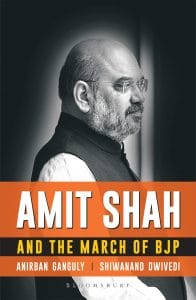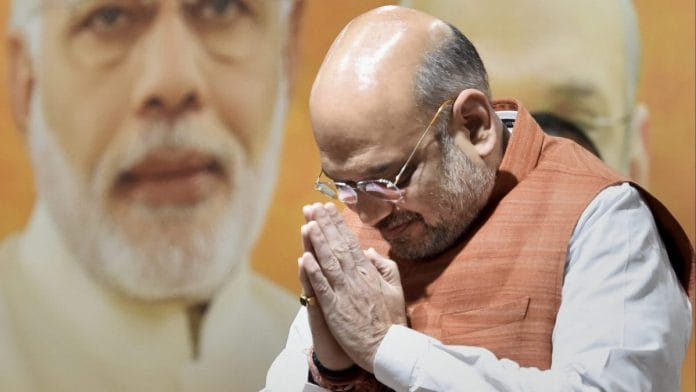It was really as home minister of the state [Gujarat] that Shah left a distinct mark. His tenure saw a return to normalcy for a state that had seen repeated communal convulsions and prolonged phases of curfews.
The sea change that the state saw can be gauged from an answer Shah once gave when asked whether Muslims won’t feel insecure if a BJP government came to power at the centre; Shah retorted that in years that he was in the home ministry, ‘not a single Muslim rickshaw-puller had any fear while cycling through Hindu dominated areas like he had during Congress rule. In old Ahmedabad, Muslim girls [were] regularly attending schools’. One saw ‘hundreds of Muslims around the newly built Vastrapur Lake in Ahmedabad. It was impossible under Congress rule to stroll in public places. In the last ten years, hundreds of Muslims have become small-scale and medium-scale entrepreneurs in Gujarat’, which ‘[was] unprecedented’.
The time between 2002 and 2010 were years of innovation and challenges. Shah made innovations and resolutely tackled the challenges. From 2003 to 2008, there was not a single event of terrorism in the state; in 2008 however, Ahmedabad was struck by serial blasts, the handiwork of the Indian Mujahideen. The state machinery displayed great alacrity in identifying and hunting down the terrorists and as Shah had then promised, such acts were never again repeated at least in Gujarat. The year 2008 was an especially bad year with serial blasts taking place in Jaipur, and Bangalore as well. Shah had sensed that these were pre-planned cold-blooded acts with the intent of breaking the ‘spine of the Indian economy’, aimed to ‘destroy the political arrangement of the nation’ and eventually to ‘destroy the confidence of the people of India’. In the immediate aftermath of the Ahmedabad serial blasts episode, Shah called for a larger debate on how terrorism needed to be tackled and eventually eliminated. He made very poignant but bold suggestions. He argued that there was a need to ‘have a legal provision to limit the debate on terrorism by nongovernmental organisations’ and that the police’s zero tolerance against terrorism—a line that Shah himself would take as the state’s home minister—‘should not be viewed from the premise of human rights. The police’s zero tolerance against terrorism itself is a human right. Ultimately, the police is acting to protect innocent people’s human rights’.
Also read: Amit Shah is the ‘prime’ minister in Modi cabinet & he hits where it hurts
Shah called for looking at the human rights discourse differently, ‘otherwise, to gain popularity—in the absence of understanding and sometimes deliberately—NGOs were helping the motives of terrorists’. Shah argued for ‘stronger laws to punish terrorists’ and opposed ‘any debates that would demoralise the approach of security agencies to fight them’. ‘Having seen the horrifying terror on the ground, there should not be any dispute among us in fighting against it,’ he pointed out. In order to stop terrorism, he argued, it was necessary to instill ‘the fear of security agencies and security forces in the mind of terrorists’. He pointed out how in Gujarat under Prevention of Terrorism Act (POTA), fourteen cases were tried and punishment meted out, and how this had ‘helped to keep the state terrorism free for six years’.
These were issues that the Congress-led UPA government at the centre was unwilling to address, its dithering and often confused signals—as in the case of the Batla House encounter in Delhi’s Jamia Nagar where the police gunned two Indian Mujahideen terrorists, with senior leaders of the Congress criticising the operation and some like Sonia Gandhi crying over it—allowed powerful conglomerates of NGOs with affiliations of all sorts to champion the so-called human rights of terrorists. True to his words, Shah clamped down on terror networks across the state, by busting modules, laying a strong network for coastal security and modernising the police force.
The years between 2010 and 2012 were perhaps Shah’s most challenging years. The Congress-led and Sonia Gandhi controlled UPA dispensation in Delhi machinated and slapped false charges of a fake encounter against Shah. By then Shah had succeeded in dealing a back-breaking blow to terror networks in the state through his zero tolerance policy towards terrorists. This zero tolerance approach of his saw Sohrabuddin Sheikh, the dreaded extortionist, arms racketeer and terrorist wanted by the police of five states, killed by the Gujarat police in a stiff encounter.
Also read: Amit Shah emerges as de facto deputy PM after Cabinet committee reshuffle
It is necessary to mention here that during the period of his stewardship of the home ministry in the state, 1,200 encounter cases were recorded nationally and nineteen cases occurred in Gujarat. However, because of the Congress party’s obsession with trying to destabilise the BJP in Gujarat, all nineteen cases of Gujarat and just one case from the remaining 1,189 cases were selected for inquiry. The debate that Shah wanted to be initiated on terrorism in 2008 seemed prescient.
In July 2010, after the charge sheet was filed, Shah resigned as home minister and presented himself before the CBI. The CBI arrested him and Shah faced imprisonment for ninety days. During this period, leaders like L.K. Advani and Arun Jaitley visited him. Shah, however, was soon out on bail with the Gujarat High Court accepting that ‘there is no prima facie evidence against Amit Shah’. Shah took the unequivocal stand that his position will be vindicated, that the cases were politically motivated, that he would fight them legally and emerge unscathed. ‘My case will not stand a judicial trial,’ Shah had asserted. Just the day after Shah was granted bail, a petition was filed that an out-on-bail Amit Shah in Gujarat would influence witnesses in Gujarat. The Court directed Shah to leave Gujarat. It would not be wrong to say that this was the most difficult and challenging phase of Shah’s life and political career.
The period of his imprisonment, at the Sabarmati Jail, where he would spend most of his time reading and taking classes for other inmates, or the phase of his exile from Gujarat to a one-room shelter in Gujarat Bhavan on the national capital’s Kautilya Marg, the daily grind of cases, his wide travels across the country and the Hindi heartland, his study and internalisation of the political and social matrix of this region, his near ceaseless reading and immersion in the world of thought and reflection—these were the times in which Shah’s intense will power and faith in the rectitude of his actions and cause sustained him. His one room retreat had become his ideological laboratory. Eventually in December 2014, the special CBI court absolved Shah of all charges on the ground that the case was ‘politically motivated’. ‘I found substance in the main contention made by the applicant [Mr Shah] that he was involved in the case by the CBI for political reasons,’ special CBI Judge M.B. Gosavi said.
Those lawyer friends of Shah’s who were his constant companions during this phase never saw him restless or agitated and never heard him assert that the party must fight his cases or provide for them. He would always prepare for his cases at his own level with help from a select group of friends and acquaintances. In 2012, Shah was allowed to return to Gujarat by the Apex Court, despite the Congress government’s effort to prevent him from returning to the state and taking up the reins of the assembly election campaign for the party. The first thing that Shah did on being given the Apex Court’s nod was to head straight to offer prayers at the iconic Somnath Temple, one of the most enduring symbols of resistance and resurrection.
Back home in Ahmedabad, Shah was received by a surging sea of party workers and supporters. ‘The way in which central government institutions are being misused in democracy,’ he told the waiting crowd outside his residence, ‘the only answer we can give to Congress is to work hard to win the coming state elections with massive majority. The state elections will decide the road to the 2014 national elections and the entire country is keenly watching the (state) elections.’ Shah’s words that evening proved prophetic. The 2012 assembly elections was Modi’s stepping stone to Delhi, the BJP came back with a thumping majority in the state and Shah himself won his fifth straight victory from the newly carved out Naranpura constituency.
 This excerpt from Amit Shah And The March Of The BJP has been published with permission from Bloomsbury India.
This excerpt from Amit Shah And The March Of The BJP has been published with permission from Bloomsbury India.







What about murder of Hiren Pandia?